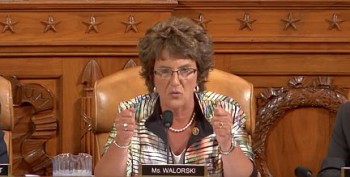 WASHINGTON – U.S. Rep. Jackie Walorski (R-Ind.) Thursday pointed to the examples of three small business owners testifying at a House Ways and Means subcommittee hearing to demonstrate how tax reform will jumpstart our economy and boost job creation.
WASHINGTON – U.S. Rep. Jackie Walorski (R-Ind.) Thursday pointed to the examples of three small business owners testifying at a House Ways and Means subcommittee hearing to demonstrate how tax reform will jumpstart our economy and boost job creation.
“The risk that is taken by small business in this country is unparalleled, because there is no backstop,” Congresswoman Walorski said. “But the backstop that you seem to be asking us for is a tax reform that works for you, not against you. It works for your future employees, not against them. It allows all ships to rise in this country.”
Thursday’s hearing of the Tax Policy Subcommittee, entitled “How Tax Reform Will Help America’s Small Businesses Grow and Create New Jobs,” was the latest in a series of hearings as the committee continues working toward permanent, comprehensive tax reform. Witnesses included:
- Teresa Meares, president of DGG Uniform and Work Apparel, which has 15 employees;
- Scott E. VanderWal, owner of VanderWal Farms, which employs five family members and some college students on a part-time basis;
- Rebecca Boenigk, CEO of Neutral Posture, which has 90 employees and 60 independent contractors; and
- Chye-Ching Huang, deputy director for federal tax policy at the Center on Budget and Policy Priorities.
BACKGROUND
House Republicans in 2016 unveiled their Blueprint for simplifying the tax code, lowering rates on individuals and families at every income level, and delivering the lowest rates in modern history for job creators of all sizes. The House Ways and Means Committee now is working with the Trump administration and the Senate toward an agreement on tax reform legislation.
A recent report by the nonpartisan Tax Foundation found the House Republican tax reform Blueprint would lead to the creation of nearly 1.7 million new jobs nationwide – including more than 36,000 in Indiana – and increase take-home pay for middle-income Hoosier households by more than $4,500 per year on average.
Video of Walorski questioning witnesses at the hearing is available here. The text of her questions is below.
REP. WALORSKI: “I am so grateful, especially the three of you that are running small businesses, came in, all the way in here as Representative Kelly talked about. I am fascinated, though, I have to just bring this to everybody’s attention. In Ms. Huang’s written testimony, Figure 2 here says, ‘Trump-like pass-through rate cut would not benefit low- and middle-income Americans.’ And I’m sitting here listening to this testimony, and I’m thinking, this is one of these issues where it looks like we can’t see the forest for the trees because of this glaring one percent. So I want to ask all three of you that are actually running businesses: How many employees do each of you have? Ms. Meares, just start here and just go down the line.”
MS. MEARES: “So, total right now is 15, as I just hired five in the last six months.”
REP. WALORSKI: “Mr. VanderWal.”
MR. VANDERWAL: “We employ five family members and a couple of part-time college kids on our farm.”
REP. WALORSKI: “Ms. Boenigk.”
MS. BOENIGK: “We have almost 90 at the factory in Texas, and then we have independent reps across the country and in Canada. So 60 more that we pay on a 1099 basis.”
REP. WALORSKI: “Are any of your employees in a category that would be in that one percent of rich Americans? … No?”
MS. BOENIGK: “Neither are we.”
REP. WALORSKI: “Would tax reform allow you to pay more people more money, hire more people? And if you hire more people, do you think you will hire people that are in that one percent rich, or are they going to be average, middle-class Americans?”
MS. BOENIGK: “Average, middle-class Americans.”
REP. WALORSKI: “I think that one of the things that we miss when we sit on these committees is, you know, all the statistical information that comes out, the ‘can’t see the forest for the trees’ kinds of things. But I mean, what I hear today from all of you that have employees, that you’re actually engaged in this every day, is that a pass-through rate cut raises all ships. And when all ships raise in this country, that’s how we get the most efficient, accurate increase in money and productivity in the lower- and middle-income in this country, because all ships rise.
“So as we’ve been looking at this, in a way to come in and be of the most benefit to you, I see this headline as being very blinded to what we’ve heard here today. That we’re not having a discussion about the House budget plan, the Trump-like tax reform plan, we’re not having a discussion about the one percent. We’re talking about energizing a growth factor in this country that will literally spark an economy where all ships rise, and they do it quicker and not slower because it answers – well, what I think it does is answer the question, and what I’ve heard from you today – is this tax reform plan has to be permanent. This tax reform plan has to raise all ships in this country.
“It can’t be concentrated on one percent, and I think we’ve proven today in all of your testimony the reflection of the hard work, the risk that you take, the risk that is taken by small business in this country is unparalleled, because there is no backstop. There is a backstop to everything that we do here, and it’s taxpayers, hardworking taxpayers’ money. But the backstop that you seem to be asking us for is a tax reform that works for you, not against you. It works for your future employees, not against them. It allows all ships to rise in this country. And that the expediency should be on our part to urgently move this legislation. Would that not be the summary of what we’ve heard today?”
MS. BOENIGK: “That would be wonderful. “
REP. WALORSKI: “I very much appreciate it, and I appreciate your hard work. Thank you, Mr. Chairman, and I yield back.”
Walorski represents the 2nd Congressional District of Indiana, serving as a member of the House Ways and Means Committee.











